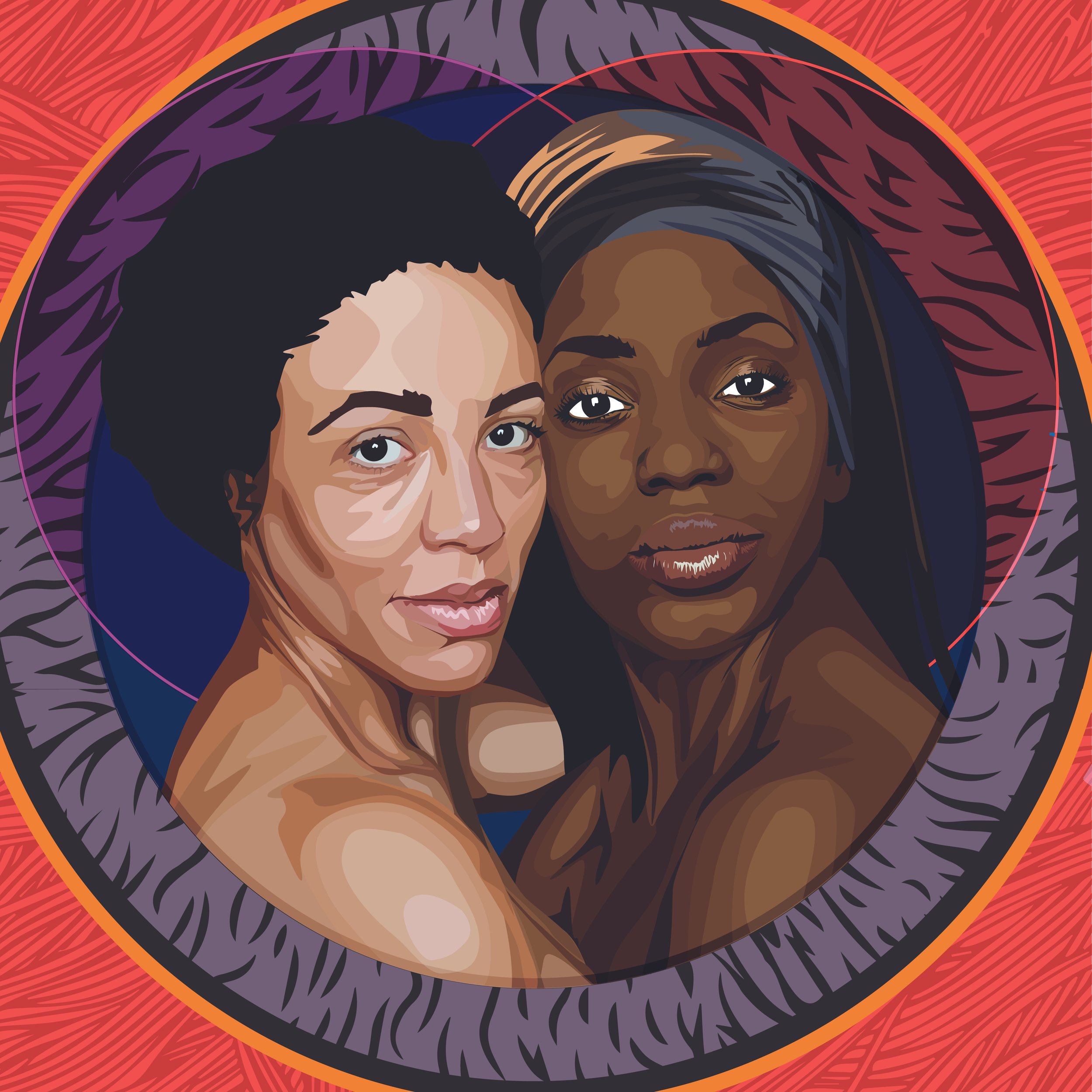Felicitas: Slave, Mother & Martyr
On the day of her death, Felicitas was led into the arena alongside Perpetua, both of these young mothers were fiercely confident that their martyrdom was what they were called to in the face of the "evil" Roman empire, and that their persecution would solidify a place of honor for them in Heaven.
The account of The Martyrdom of Saints Perpetua and Felicitas does not give us clarity as to whether or not Felicitas was Perpetua’s slave, however they knew each other well, and they were linked together through their faith and through their ordeal as mothers to young babies. Both of these women defied societal and biological expectations as women, and in Felicitas’ case, she stood up to power as a female slave, boldy defying expectations for obedience in ancient Roman culture.
A slave woman and birthing mother
By Roman law, although she was a slave, Felicitas would have still been given the opportunity to pay tribute and express her patriotism toward the emperor to escape execution in the arena.[1] However she did not, and instead she and Perpetua prayed together for Felicitas to give birth prematurely, (In her “8th month”), so that she would have the opportunity to be martyred alongside her Christian cohorts as opposed to common criminals and thieves (It was illigal to execute a pregnant woman). Their prayers were answered, and Felicitas gave birth two days before their scheduled death in the arena.
As she gave birth, the narrative in The Martyrdom of Saints Perpetua and Felicitas portrays Felicitas as alone, however it is likely that Perpetua assisted. As she labored in pain, the prison guard mocked her, saying: “If you're crying in so much pain now, what is it going to be like for you when you face the beasts!”. Felicitas responded: “Now I alone suffer what I am suffering, but then there will be another inside me, who will suffer for me, because I am going to suffer for him” (Pass. 15.6).[2] Felicitas’ baby survived birth and was given to a woman in their church community to be brought up.
Felicitas the Martyr
Felicitas’ account is remarkable because of the tremendous power it communicated to the early church about martyrdom, its importance, and Felicitas’ legacy as a Christian to honor and venerate even though she was a slave.
Imitatio Christi
At this time in history, Chrisitans believed and took very literally imitatio Christi, the idea that Jesus’ words from Matthew 16:24 and Luke 9:23, meant that all those who follow Jesus must take up their crosses to follow him, whatever that entailed.[3] Felicitas and all believers of this time held strongly that to be persecuted and killed as a Christian was to most fully and completely align themselves with Christ. Felicitas’ story links her suffering in labor with her suffering in the arena and connects it to Jesus’ suffering on the cross. The narrator weaves the imagery of motherhood, birth, re-birth and baptism together, reinforcing the power and importance of martyrdom for Christians in the early church.[4]
Martyrdom in the Arena
The women were sent out into the arena, essentially naked, covered only by a fabric similar to netting. The crowd fiercely opposed the indecency.[5] The text describes Felicitas’ milk dripping from her breasts, a clear indication she had just given birth. Both women were young, attractive and not the typical criminals that were seen in the arena. These women on display, coupled with the abuse typically reserved for the worst criminals, crossed a threshold of acceptability even for this barbaric crowd of observers. The women were then sent back to be covered before they appeared again in the arena.
As she approached her martyrdom, Felicitas is described as being “joyful”, having just experienced the miraculous birth of her daughter, she could now be included for martyrdom with her fellow Christians.[6] The text describes her as “advancing from blood to blood, from the midwife to a net-bearing gladiator--now to be washed after childbirth in a second baptism”(Pass. 18.3).[7] This gives us a fascinating insight into the theology of martyrdom of the time. A water baptism was known to cleanse a person of their sins, bringing them into the church family, however martyrdom was considered a second baptism, one of blood that imitated Christ and would secure salvation.[8]
Powerful words from a slave woman
Felicitas’ account is remarkable because of the tremendous power it communicated to the early church about martyrdom, its importance, and Felicitas’ legacy as a Christian to honor and venerate even though she was a slave.
Slavery at this time was not race-based but it was just as horrendous and grotesque as our more modern western history of slavery. No outward physical characteristics such as skin, hair, or eye color determined if one was a slave however they would be marked by short hair and regular bruising as they were often beaten.[9] Felicitas could have been captured anywhere to be sold as a slave. There is no way of knowing her heritage or appearance.
Felicitas’ powerful theology
Given her incredibly low social status in a hierarchical, honor/shame ancient society, Felicitas’ powerful theolgoical statement that aligned her with Christ was extremely radical. First, Felicitas declared that her death would align her with a man--Christ--and secondly, would align her with Jesus’ power and suffering. Her testimony is considered the most eloquent, powerful and impactful among all of the martyr’s testimonies.[10]
Her theological statement in the narrative was so powerful in fact, that in the 5th century Augustine sought to undermine it by using her as an example of female frailty in the face of her great popularity and representation of strength. He cited her as an example of the need for women to overcome more than men, since the fall was brought about by Eve, he explained women must find salvation by attaining a more “manly spirit”.[11] Augustine emphasized that it was Christ who filled both Perpetua and Felicitas with courage, and gave them the ability to “die faithfully like men”, and achieve resolution for their sinful nature to become Saints in heaven.[12]
Patron Saints of Same-Sex Couples & Transgender identity
Perpetua and Felicitas have been upheld by LGBTQ Christians and allies as the patron saints of same sex couples and of lesbians in particular. Yale professor and historian John Boswell whose studies focused on homosexuality in Christianity counted Perpetua and Felicitas as one of three same-sex couples from the early church.
Although impossible to prove with our limited sources, several clues have pointed to the likelihood these two “dear friends" shared more than just friendship. Perpetua was married, however her journal entries conspicuously do not mention her husband and instead are filled with descriptions of Felicitas’ experiences in prison. Since homosexuality was not officially recognized at the time, and no terms were available to define it, words translated to “dear friends”,
“roommates” and “companions” have been identified as code for romantic involvement.
Perpetua’s dream of taking on a masculine form and finally being at peace as a victor when she assumes a male body has been a significant inspiration for transgender Christians. In her rejection of her expected female role as a daughter and mother, Perpetua embraced her vision of herself as a male where she came into herself most fully and was able to achieve victory over evil.
Perpetua & Felicitas' Legacies
Martyrdom wasn’t incredibly common for Christians, only those who were the loudest and most threatening to the empire faced this fate typically reserved for thieves and criminals. Perpetua's ability to write down the stories of these martyr's experiences created a massive influence in the early church and shaped the Christian ideal of suffering and sacrifice. Her authority, resilience and defiance against the social norms of the day represented a clear mark of egalitarianism and was a rallying cry for slave's and women’s equality in the church. The preservation and circulation of her work is a testimony to its importance not only to the Montanists but to all streams of the early church. The Passion of Saints Perpetua and Felicitas was used in liturgies, sermons and shaped devotional practices such as the development of iconography and the practice of venerating saints. Today, all people can be inspired by Saints Perpetua and Felicitas as courageous leaders in the face of violence. Advocates for justice can be encouraged by these women as revolutionaries who refused to retaliate in the face of oppressive violence and as those who spoke truth to power in unexpected ways that shaped the church for centuries.
Reflect
Stories like this one in history remind us of how both society and the church has evolved, however the misogyny and the power dynamics between men, women and social classes is still frustratingly too familiar and the abuse remains.
What do you see as the biggest differences from your experience with Christianity with the experience of Felicitas and her ideas of martyrdom?
What obstacles and power dynamics from Felicita's time still remain to this day in the church? And in society as a whole?
In what ways do you see God working in Felicitas’ life? Do you see any mercy or divine love that shows up in such a tragic story?
Do you think this story is a lost cause for the church today or do you feel there is something valuable to be learned from these martyr stories? Is there anything at all you can sense that encourages your faith in this account of Christian faithfulness?
About the art
I have chosen to retain the same background textures and images here for Felicitas as I did for Perpetua, only changing her color palette. Perpetua and Felicitas’ martyrdom stories are so woven together, I felt the need to keep them linked together even in their iconography. Felicitas is represented here as mixed racially. The reality is we do not know the color Felicitas or Perpetua. Slave and free people in the Roman world and especially in Carthage represented a wide spectrum of skin color, eye color, and hair color.
As a slave woman, Felicitas could have been from Ethiopia, Egypt, Germany or really anywhere that slave capturing was common practice. Felicitas’ hair is short as would have likely been the case culturally, but her face is dignified and strong. From her image she looks at us from heaven (as is the belief in iconography) as a strong, dignified and wise all-knowing mother, at peace and ready to encourage and pray in solidarity.
Notes:
Eliza Rosenberg, Katie Nelson & Olivia Meikle. “The Martyrs: Perpetua and Felicitas”. What’shername podcast. Podcast audio, August 27, 2018. https://www.whatshernamepodcast.com/perpetua-felicitas/
Lynn H Cohick and Amy Brown Hughes. Christian Women in the Patristic World : Their Influence, Authority, and Legacy in the Second through Fifth Centuries (Grand Rapids, MI: Baker Academic, 2017), 59.
Cohick, “Christian Women in the Patristic World”, 59.
Cohick, “Christian Women in the Patristic World”, 59.
Rosenberg, “The Martyrs”.
Cohick, “Christian Women in the Patristic World”, 60.
Cohick, “Christian Women in the Patristic World”, 60.
Cohick, “Christian Women in the Patristic World”, 61.
Rosenberg, “The Martyrs”.
Cohick, “Christian Women in the Patristic World”, 62.
Cohick, “Christian Women in the Patristic World”, 60.
Cohick, “Christian Women in the Patristic World”, 60.


